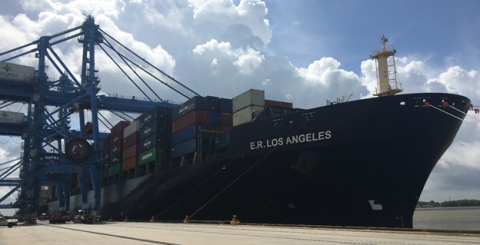Thousands of unionized dockworkers walked off the job at ports along the U.S. East and Gulf coasts October 1 in the first work stoppage for those regions since 1977. Three days later, they’re heading back to work with a tentative deal on wages in hand and an agreement to continue negotiating on other issues through mid-January. The strike didn’t threaten liquid exports like crude oil and LNG but imports of action figures and exports of plastic pellets used to make them — as well as other dry containerized products and feedstocks — hit a brief standstill. In today’s RBN blog, we’ll examine the potential fallout avoided by the labor agreement.
News of a U.S. dockworker strike typically conjures up thoughts of California — specifically, the ports of Los Angeles and Long Beach, the biggest gobblers of containerized imports that reach North America, where contract talks get strained every few years. This time dockworkers at ports on the other two U.S. coasts went on strike in a contract dispute that choked containerized commerce — the dry stuff that arrives either in huge metal boxes stacked on container ships or vehicles in roll-on/roll-off cargo ships. (Roll-on/roll-off, or commonly called ro-ro, refers to ships built so vehicles can drive on and drive off, whether they be cargo ships or ferries.)
Here in the RBN blogosphere we focus quite a bit on liquid energy like crude oil, gasoline and diesel, as well as gases chilled to liquid form for transport, like LNG, propane and ethane. Talk of the International Longshoremen’s Association (ILA) strike in the days leading up to the walkout focused largely on how a prolonged stoppage could slow those Amazon deliveries and perhaps even bring a blue Christmas for children seeking the hottest toys. Fresh fruits like bananas? Brown mush sitting in a container on a ship unable to berth.
Major liquids exporters and importers weren’t concerned about the strike’s impact on their operations, as dockworker unions like the ILA have limited direct involvement with tanker movements, if any. ILA members are dockworkers at container terminals and don’t handle liquid cargo. But container terminals at U.S. ports that do billions of dollars in business every year faced a potential protracted strike’s impact like a sharp knitting needle jammed in your thigh — a knitting needle that could have been imported to the U.S. in a metal box unloaded from a massive ship by a huge crane (see photo below).
Figure 1. Container Ship Docked at the Port of New Orleans. Source: RBN
Join Backstage Pass to Read Full Article








